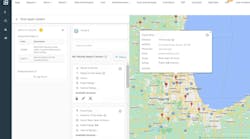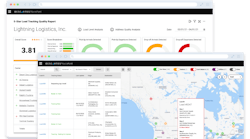A major strategy of protecting fleet equipment is to use artificial intelligence, or AI, to watch for clues in a truck's wealth of data to prevent it from suffering a breakdown, just like preventive health care can keep a person from experiencing a more severe and costly adverse health event.
"A lot of what happens with a vehicle has a cascading effect," noted GK Williamson, who works in fleet business ventures at Uptake, an artificial intelligence and IoT software developer. "Problems often start out very small and ripple on from there," he said.
The company has products and services such as Uptake APM (asset protection management), an interoperable software-as-a-service offering designed to complement customers' existing equipment management systems. It includes Uptake's Asset Strategy Library, which the company claims is the world's largest database of equipment types, failure mechanisms, and maintenance tasks.
The goal is simple: "We're trying to reduce the amount of downtime of our customers' vehicles and the overall maintenance spend of the company," Williamson said. He explained that Uptake's team of data scientists looks at the vehicle data available and crafts algorithms "that will predict equipment failures days, weeks, even months in advance of them actually happening."
Uptake's vision and mantra is that "machines don't have to break." It's not only the transportation industry that could benefit from reliable advance notice of parts and equipment failures, Williamson pointed out, but manufacturers and businesses of many kinds.
For fleet trucks, he described several vehicle health AI/predictive models Uptake has developed. The first was for truck battery health, since "typically, battery replacements and failures account for about 40-60% of unplanned service interruptions," he said. Two other models monitor for problems with the diesel particulate filter (DPF) on diesel-powered trucks and with trucks' temperature-control systems.
Using one of those models, Uptake's system was able to identify a problem with a DPF filter about seven days before the filter failed, Williamson said. "If we're talking about downtime of these vehicles and trucks not being available, that company would be losing money," he emphasized.
It returns to the point of a "cascading effect" within truck problems and breakdowns. "If we can figure out and predict that there's a problem with a fan clutch or your cooling system, for example, that might mean a few hundred dollars or so for a repair compared with something larger like a whole transmission failing and costing thousands and thousands of dollars to fix," he said.
Detecting problems on trucks well before they occur can be especially important for fleets, since even after knowing there's a problem, some may take weeks or longer to plan and perform the service to get it fixed. And getting accurate notice farther in advance means that a fleet might be able to schedule fixes for non-urgent problems that arise during already-planned or routine maintenance stops.
"The sooner the fleet can have this information in their hands, the sooner they can get their trucks back on the road and operating," Williamson said.




